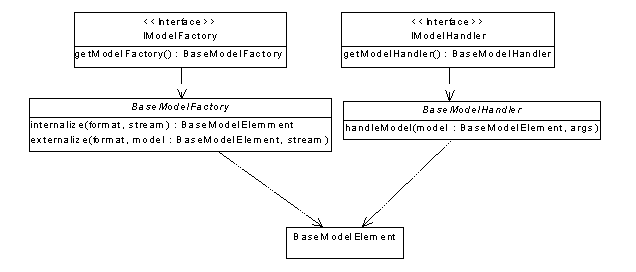The Basil Model Framework
Jonathan
Riehl

Figure: The Basil
Model Framework Class Diagram
The figure above illustrates the current state of the class design behind the Basil model framework. Using generator scripts, model modules may be created from meta-models (such as a DTD, MOF model, or the NovoSoft meta-model.) The generated modules conform to the IModelFactory interface and contain a specialization of the BaseModelFactory class. Additional generators allow model translation by providing a handler framework that mirrors the model module via a separate interface (IModelHandler and BaseModelHandler.) All of these are documented in more detail below.
- IModelFactory
The IModelFactory simply defines an interface that allows a module (in the current Python implementation, the Python module conforms to this interface) to return an instance of the factory class for a model (the Python implementation diverges somewhat by returning the class itself, leaving the caller responsible for instantiating the factory class.) - IModelHandler
The IModelHandler mirrors the IModelFactory class by exposing an interface that allows clients of the handler module to obtain a handler instance. The handler class is described below. - BaseModelFactory
The BaseModelFactory is an abstract base class for a given model’s factory class. As such, the BaseModelFactory exposes an interface that allows a model to be internalized from a serial stream or externalized to a serial stream. In the current implementation, the BaseModelFactory implements an internalize (and hopefully an externalize) method for the “XML” format. Subclasses of the BaseModelFactory may implement externalization and internalization routines for other formats as well. Additionally, subclasses are expected to provide methods for the construction of model elements. - BaseModelHandler
The BaseModelHandler is an abstract base class that provides an interface or the traversal of a model. Handler subclasses are bound to specific model implementations for the purpose of performing a specific model wide function (such as code generation from an XMI model.) The processModel() method allows for arguments that are meaningful to the handler to passed as a vector (in the current implementation, these are used to process excess command line arguments.) - BaseModelElement
The BaseModelElement class is the primary abstraction class for all model elements. In the Python implementation, the role of the BaseModelElement is served via the UserList class from the standard Python library.